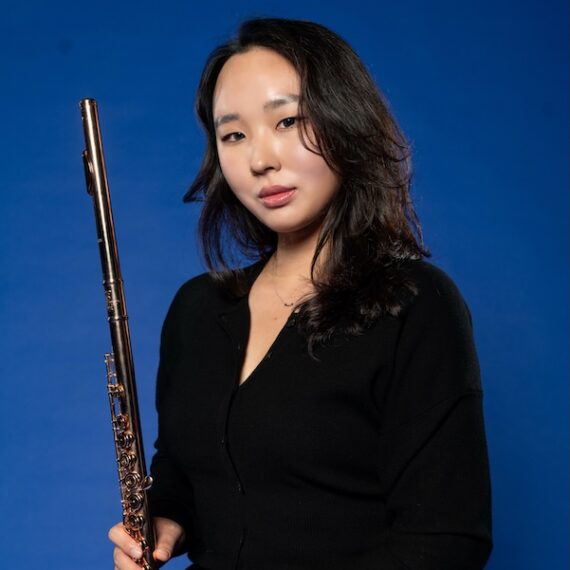Awards/Competitions
Winner, 2024 Lynn University Concerto Competition; 4th Prize, Napolinova 2nd World Flute E-Competition, Italy, 2021; Winner, 2019 CCM Concerto Competition; First Prize, 2013 Korea Chamber Orchestra music competition; 6th Prize, 2010 AFF (Asia Flutist Federation) competition, Shanghai
Appearances
Napa Valley Music Festival, 2025; Imani Chamber Music Festival at Juilliard, 2023; National Orchestra Institute festival, 2021; Korea Chamber Orchestra summer camp fellowship, 2012–15, 2018,
What is your earliest memory of classical music?
I started playing the piano at 5 years old. Then I changed to flute at the age of 10. I wanted to play cello but the flute was cheaper in the shop, so I chose flute.
Was there a teacher who was particularly impactful/helpful? What made this instructor stand out?
I have been fortunate to study with three great flute teachers who shaped me in meaningful ways. Dr. Yoonyoung Esther Lee was like a musical mother to me, building the foundation and structure of my playing, and I will always carry her lessons with gratitude. After coming to the United States, Professor Demarre McGill guided me with passion and helped me discover the direction I could take as a musician. Mr. Jeffrey Khaner gave me lessons far beyond what I had ever imagined, sharing insights I could never have anticipated. He also guided me through some of the most challenging times in my musical journey, helping me grow both as a musician and as a person. Each of these teachers stood out not only for their artistry, but also for the wisdom and humanity they shared with me.
How would you like to see orchestra concerts evolve in the future?
I would love to see orchestra concerts become more interactive and immersive, where audiences feel truly connected to the music. Programs like outreach concerts can help bring music to wider communities, and I believe that if orchestras put effort into education, it will inspire future generations to engage with classical music. Having dedicated youth programs is essential to cultivate lasting interest and support for the art form.
What is the most memorable performance you ever had?
When I was 13, I used to play the flute every Sunday at my church. One day, through my parents, a church member asked me to play for his seriously ill wife. I would visit her home occasionally and play a few hymns. She had only a few days to live according to her doctor, but somehow, she lived longer than expected. Experiencing the healing power of music first-hand made me realize how music can deeply touch and inspire people. That performance remains one of the most memorable of my life, and it continues to be a source of motivation for me as a musician.
What is your proudest achievement as a musician?
I wouldn’t say I’ve achieved anything yet that I can call truly remarkable. I’ve had small successes along the way, but compared to my amazing teachers, I still have a long way to go. I hope to one day accomplish something significant and make a meaningful impact as a musician.
Is there a person or people you most respect in your field and why?
I have deep respect for all musicians, both those working hard today and those who devoted their lives to music in the past. Our path is not an easy one. We often need more degrees than others, face financial challenges, and deal with constant pressures. Yet despite these difficulties, musicians continue to persevere, and I find that resilience and dedication truly admirable.
Tell us about a time you almost gave up but didn’t.
During my senior year of high school, I seriously injured my hand and was unable to play my instrument at all. I was diagnosed with trigger finger, and the doctor told me that it was caused by over-practice. With college auditions approaching, I was even advised that I might never play again. I chose medication over surgery due to fear of complications, but the treatment took longer than expected. I couldn’t touch my instrument for about two months, and the following slump, combined with ongoing pain, meant my practice time was drastically reduced for nearly two years.
Eventually, with guidance from my teacher, Dr. Lee, I decided to seek a new environment and came to the United States. There were many moments when I wanted to give up, and it was incredibly difficult, but that time forced me to reflect on what I truly wanted. Because of that experience, I have learned to face challenges with resilience, and now I am able to overcome difficult situations much more easily.
Can you share any memorable onstage mishaps?
One of the most memorable onstage mishaps happened during a chamber performance at 9:00 in the morning. I came down with food poisoning the night before, and it was too late to find a substitute. I had to take some extreme precautions, but fortunately, nothing happened during the performance. Afterward, I went straight to the hospital for an IV. That experience was really tough, and it taught me one important lesson: making a living as a musician is not easy!
Do you have a favorite non-classical musician or band?
I really like Eminem. My teacher used to tell me my sense of rhythm was terrible, so I started listening to hip-hop to improve. But hip-hop has something called laid-back rhythm, which actually made my rhythm even worse. Despite that, I couldn’t help but be drawn to his music. It is fast, rhythmic, and just brilliant.




